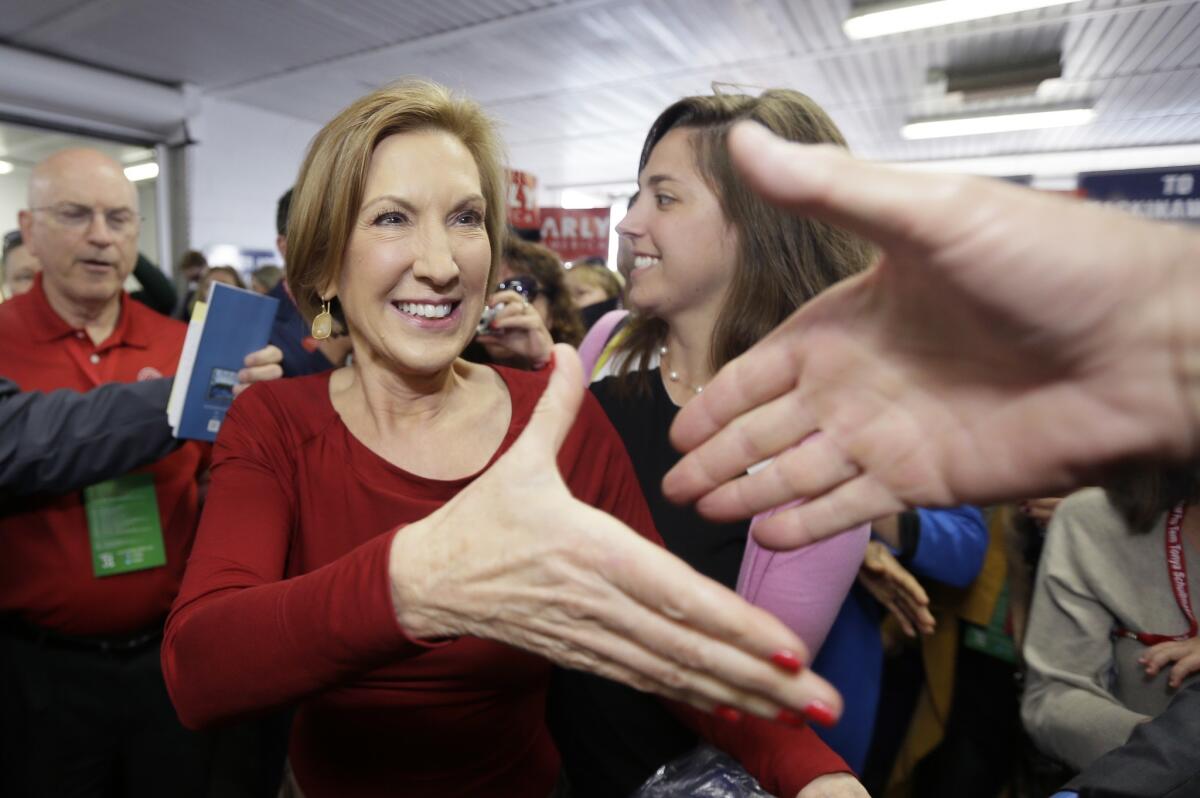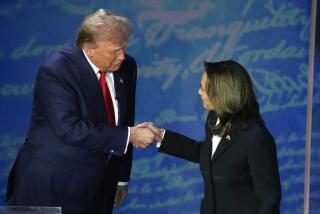Carly Fiorina won GOP debate, but Donald Trump still leads, poll finds

GOP presidential candidate Carly Fiorina, seen here greeting supporters at a Republican event in Michigan on Saturday, got top marks in a new poll for her performance in Wednesday’s debate.
- Share via
Reporting from Washington — Carly Fiorina won the Republican debate on Wednesday, but remains far behind Donald Trump in the race for the party’s presidential nomination, according to a survey released Sunday by NBC News.
Republican voters gave Fiorina and Sen. Marco Rubio of Florida the best marks for their debate performance, but Trump remains the favorite candidate of roughly three-in-10 self-identified Republicans and Republican-leaning independents, the poll found. Ben Carson, the retired neurosurgeon, was in second place with 14% and Fiorina in third at 11%.
The survey is the first of several expected from major polling organizations in the aftermath of Wednesday’s debate. The results are similar to several polls taken before the debate, indicating that although the event drew a huge national television audience, it did not greatly change the shape of the race. Debates usually don’t.
The lineup also confirms the current desire of GOP voters to go with an “outsider” candidate -- all three of the leading candidates have never held public office.
Asked which qualities were most important to them in a candidate, only 3% of Republican voters said the “right experience” mattered most. But 37% said the most important quality was someone who could “bring about needed change.” Trump supporters especially felt that way, with 46% of them putting the ability to create change at the top of their lists.
Among more traditional political figures, Jeb Bush, the former Florida governor and onetime front-runner, Rubio and Sen. Ted Cruz of Texas were bunched together with between 7% and 8% support. None of the other candidates had more than 3% support.
Asked which candidate they expect will win, a question that often has greater ability to predict election results, about one-third of GOP voters said Trump. Bush came in second with 14% and Carson third with 10%. Trump narrowly led Bush and Fiorina on the question of which candidate seemed most “presidential,” with Trump getting 17% and the other two 14%.
Republican primary voters broadly favor a candidate who would cut off federal money to Planned Parenthood, with 61% saying they would be more likely to vote for a candidate who took that position. In the electorate as a whole, that stand is a loser, with 40% saying they would be less likely to vote for such a candidate and 32% saying they would be more likely.
GOP voters differed from voters overall on another big issue -- sending U.S. troops to the Mideast. Among GOP voters, 53% said they would be more likely to vote for a candidate who wants to send U.S. ground troops to Iraq or Syria to fight Islamic militants there. Among the broader electorate, 32% said they would be more likely to vote for such a candidate, while 37% said they would be less likely.
The overall electorate was evenly divided on whether they would be more or less likely to vote for a candidate who favored a pathway to citizenship for people currently in the country illegally. Among GOP voters, a 59% majority said they preferred a candidate who opposes citizenship.
The poll, conducted for NBC by Survey Monkey, is one of the new breed of online polls that are challenging traditional telephone surveys in public opinion research. Survey Monkey, best known for its do-it-yourself surveys, has developed an enviable track record for accuracy in its online polls both in the U.S. and Great Britain. It had the only survey, for example, that correctly anticipated the results of Britain’s election this spring.
Unlike telephone polls, which call people at random, online surveys collect a large sample of Americans, then weight the results to match known demographic statistics, such as age, race and gender. The current survey questioned 5,113 adults between Wednesday and Friday, including 2,070 Republicans. The results have an error estimate of +/- 2.9 percentage points for the GOP sample.
More to Read
Sign up for Essential California
The most important California stories and recommendations in your inbox every morning.
You may occasionally receive promotional content from the Los Angeles Times.














